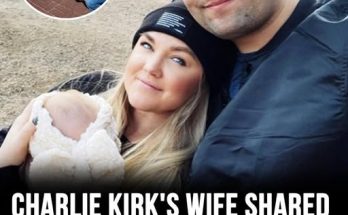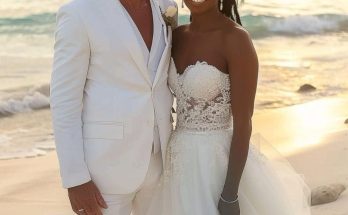The nation is still reeling from the tragic death of Charlie Kirk, the 31-year-old conservative activist and co-founder of Turning Point USA. He was struck down during a speaking engagement at Utah Valley University on September 10, leaving behind his wife, Erika, and their two young children.
Now, shocking revelations have emerged that Kirk had been given a direct warning months earlier: unless he dramatically upgraded his protection, his life would be at risk during a university event.
A Dire Warning Ignored
According to Kris Herzog, a veteran security specialist and owner of The Bodyguard Group of Beverly Hills, he personally cautioned Kirk in March of this year that his public appearances were dangerously under-protected.
“I told him he would 100% be killed at one of his upcoming university speaking events if security was not significantly increased,” Herzog explained in an interview.
His warning was stark. He outlined exactly how a sniper might target Kirk, predicting that a head or neck shot would be the most likely. Herzog urged Kirk to shield his stages with ballistic glass, use metal detectors at entry points, screen attendees within several hundred feet, and station trained officers on rooftops and elevated areas to prevent sniper fire.
Tragically, just six months later, the exact scenario Herzog described came true.
The Fatal Afternoon
On the day of the event, Charlie Kirk was midway through one of his signature “Prove Me Wrong” debate sessions. These open forums were designed for college students to challenge his political and cultural ideas, often drawing large and passionate crowds.
Witnesses said the event had an energized but calm atmosphere—until it turned to chaos. Around 12:20 p.m., a single crack of gunfire echoed across the courtyard.
Kirk, seated under a canopy, slumped backward in his chair. The bullet had struck his neck. Audience members screamed, ducked for cover, and scrambled to escape.
One attendee described the horrifying moment:
“I saw blood, I saw him kick back in the chair, and then everybody dropped to the ground,” recalled Justin Hickens, who was sitting only 60 feet away.
Security rushed to Kirk’s side, and he was transported to the hospital. Despite emergency care, he died roughly ninety minutes later.
Troubling Lapses in Security
As more details emerged about the event setup, many questioned how a figure as prominent and polarizing as Kirk could appear with such minimal protection.
Several attendees noted that no tickets were checked at the entrance, despite advance registration requirements. There were no bag checks, no metal detectors, and only a handful of security staff visibly present.
“It just felt off,” said another attendee, Raydon Dechene. “Bags weren’t checked, and there didn’t seem to be much security at all.”
For those who had expected thorough screening, the absence of even basic measures seemed unbelievable. Given the large crowd and Kirk’s reputation as a lightning rod for heated debate, critics argue the setup left him vulnerable.
Echoes of Past Warnings
Security professional Mark Wilson, who had also observed Kirk at a rally earlier this year, commented on the activist’s tendency to keep himself accessible to the crowd.
“He rarely wore protective gear and often stood very close to attendees,” Wilson explained. “That accessibility made him relatable, but it also increased the danger.”
Herzog, who had laid out specific recommendations months earlier, said he was devastated but not surprised.
“Sadly, he never got back to me,” Herzog reflected. “And now my prediction has come true.”
Final Words Before the Attack
Just before the shooting, Kirk was responding to a question from a student during the debate session. The exchange centered around statistics about violence, a common theme in his debates.
His last words, according to reports, were sharp and confident—followed by applause. Within moments, the gunfire ended the conversation, and his life.
For many, the sequence of events underscored just how suddenly tragedy can strike.
A Family and Movement in Mourning
Charlie Kirk leaves behind his wife, Erika Frantzve, their three-year-old daughter, and a 16-month-old son.
Supporters across the country describe him as one of the most influential voices of his generation in conservative politics. His organization, Turning Point USA, mobilized thousands of students, building a youth-centered movement around free speech and limited government.
While he was a polarizing figure, his ability to draw young audiences and energize campus debates made him a central character in America’s political landscape.
National Leaders React
The news of Kirk’s death drew responses across the political spectrum.
Former President Donald Trump paid tribute to Kirk on Truth Social, calling him “The Great, and even Legendary, Charlie Kirk.” Trump ordered that flags be lowered to half-staff nationwide until Sunday evening in Kirk’s honor.
“No one understood or had the heart of the youth in the United States of America better than Charlie,” Trump wrote. “He was loved and admired by all, especially me.”
A National Manhunt
Meanwhile, law enforcement continues its urgent search for the shooter. The FBI and Utah Department of Public Safety have described the attack as targeted and have recovered physical evidence, including a rifle believed to have been used in the shooting.
Officials are asking anyone with video or photographic evidence from the day of the event to submit it to investigators. They assure the public that every lead is being pursued with the highest urgency.
A Larger Conversation About Public Safety
For many seniors watching the news, this tragedy feels disturbingly familiar. They remember past decades when public figures fell victim to violence, and they know the weight such moments carry.
The revelation that Kirk had been warned—and that recommended protections were not adopted—adds another painful layer. It highlights how crucial event security is, especially in a time of heightened political tension.
Whether out of budget concerns, confidence in existing arrangements, or reluctance to appear unapproachable behind layers of protection, Kirk’s decision not to fully adopt expert advice will be debated for years to come.
The fact that he had been cautioned by seasoned security professionals months before makes it even more haunting. His legacy as a leader in the conservative youth movement is undeniable, but his story is now also a reminder of how fragile public safety can be.
As the investigation continues and his family grieves, Americans are left to ask hard questions: How can high-profile events be made safer? What lessons must be learned from the warnings that went unheeded?
For seniors who have lived through turbulent times, it is a somber reminder that even in moments of progress, vigilance and preparation remain essential.



